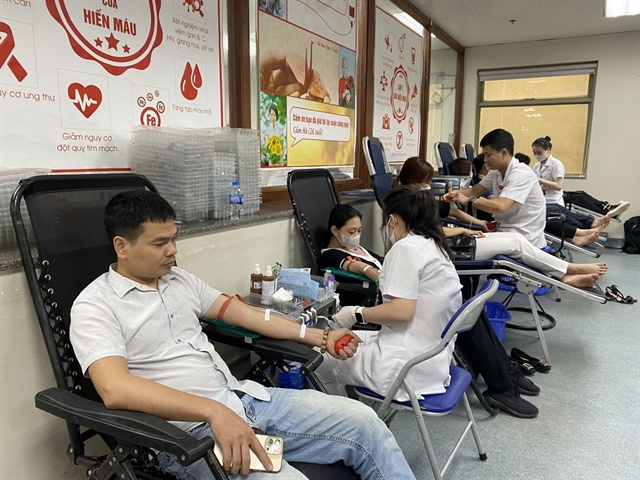 Society
Society

 |
| People donate blood at the National Institute of Hematology and Blood Transfusion. — VNA/VNS Photo Tạ Nguyên |
HÀ NỘI — In recent years, many individuals have habitually donated blood regularly, ensuring a high-quality blood source and adequate supplies for emergency treatment for patients, Vietnam News Agency reported.
The National Blood Centre, under the National Institute of Hematology and Blood Transfusion (NIHBT), serves as a hub for individuals of all ages to register for blood donation. Despite holidays, festivals, or weekdays, the atmosphere at the centre remains vibrant, as each donor contributes to the communal effort to save lives.
For some, blood donation has become a beautiful lifestyle, including Trần Thị Mai from Long Biên District in Hà Nội, who has donated blood more than 20 times since 2018.
During her recent visit, she mentally prepared herself for the donation, discussed her health with the medical staff, and expressed gratitude for being able to donate blood one more time before reaching the age limit.
“I want to donate blood on my 60th birthday to do one more good deed," said Mai. "I will try my best to stay healthy so that I can be eligible to donate blood as I wish."
“My blood type is O; many people need it. Whenever I am healthy enough, I donate up to 450ml of blood.”
Mai still remembers when she went to a monastery with a volunteer group. A blood donation programme was organised there.
Mai immediately joined the programme without hesitation.
That first blood donation made her feel very peaceful in her mind, and since then, she has determined to donate blood regularly.
“During the COVID-19 pandemic, I did not miss any blood donation schedule," said Mai. "This is when most people need blood for treatment, so I overcome my fear of COVID-19 and donate blood regularly.
"I was carefully equipped with a mask, disinfected, and ensured absolute distance according to the instructions when going to the blood donation place. I am very happy that during the pandemic period, I could still contribute my blood, helping patients receive timely treatment.”
As a young person, donating blood is a joy and responsibility for Lê Đức Hải who often takes his partner to donate blood with him.
“Every time I have a blood donation schedule, I arrange my work to go to the NIHBT," Hải said. "Personally, I also try to take care of myself to have good health and a good blood source.”
Previously, Hải was underweight and in poor health, but since trying to qualify for blood donation, his health has improved a lot.
Now he has reached a healthy weight.
“Young people are very energetic," said Hải. "Participating in voluntary blood donation is not only a good job but also a way to take care of their own health. Every young person with good health conditions should have a good habit of donating blood regularly."
Recently, voluntary blood donation has spread widely, and the people's response is increasingly strong. Many patients do not have to wait anxiously for blood.
Associate professor Nguyễn Hà Thanh, director of the NIHBT, said: “In recent years, we have seen a drastic change in people's awareness of voluntary blood donation. In the past, blood donors were mainly young people and students, only participating in festivals and big blood donation occasions. But now it has spread to the entire community, all classes of people.”
“Blood shortage in summer and Tết (Lunar New Year) doesn't happen like before. We have enough blood to provide emergency treatment to patients," he said.
The People's Day of Voluntary Blood Donation was founded on April 7, 2000, under a Decision by the then Deputy Prime Minister Phạm Gia Khiêm.
It created a strong push, changing people's awareness about voluntary blood donation.
The whole political system has joined blood donation.
Associate Professor Thanh said that in Việt Nam, 1.5 per cent of people participate in blood donation, a good percentage on the world stage.
Quality blood source
When the people’s response has helped ensure the blood supply for treatment, it is very important to aim for a safe and quality blood source.
PhD Trần Ngọc Quế, director of the National Blood Centre, said that safe blood could only be donated from healthy, regular blood donors.
He said that ensuring the safe, regular and stable source of blood donors and meeting the blood demand for treatment was one of the basic requirements for blood transfusion and decisive measures to minimise risks for patients due to infection.
Regular blood donation means that each healthy person participates in regular blood donation, on average twice a year, and is ready to support blood donation at times of blood scarcity, based on the needs of blood transfusion facilities, not just on special anniversaries.
This is also a factor that helps voluntary blood donation develop sustainably without seasonal and blood type shortages.
People who donate blood regularly always have a sense of keeping healthy. Therefore, blood donated by regular donors is the highest quality and safest.
On the other hand, blood only has a certain shelf life so maintaining a regular number of donors is vital. — VNS




